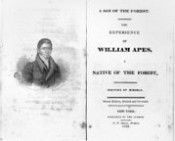Apess William

William Apess (1798–1839) was a Native American writer, preacher and politician of the Pequot tribe. Born to mixed-blood parents William and Candace (she may have been part African-American), Apess spent his life until the age of five living in the woods around Colrain, Massachusetts.[1] He was then indentured to a series of white families, who, while employing him as a servant, also provided him with an education. Apess eventually ran away and joined a militia in New York, fighting in the War of 1812. Aged only sixteen, Apess had already acquired the severe alcoholism that would dog him for the rest of his life, ultimately killing him. The years 1816 to 1818 were spent doing varied jobs in Canada, but wearied by drink dependency Apess decided to return home to his family and tribe. Within a short period he managed to re-establish his sense of himself as a Pequot tribal member, but also began to attend meetings of the local Methodist groups. He was baptised in December 1818. In 1821, Apess married Mary Wood, and the couple went on to have three children. During this period he became ever more convinced of a vocation to preach, and in 1829 he was ordained as a Methodist minister. In the same year he published A Son of the Forest: The Experience of William Apess, A Native of the Forest, Comprising a Notice of the Pequod Tribe of Indians, Written by Himself, his autobiography. Written at least partly in reaction to advocates of Indian Removal, including President-to-be Andrew Jackson, this autobiography was the first wholly Native-authored book to be published. It uses the format of the spiritual confession to ironically comment on white prejudices about Natives. As was the Methodist practice of the day, Apess and his family became itinerants, preaching in meetings all over New England to mixed congregations that would have included Native, Euro-American and African-American worshippers. In 1833, following a visit to the town of Mashpee, the largest Native town in Massachusetts, Apess became convinced that the State was acting illegally in denying the Mashpees self-government. This led to the so-called Mashpee Revolt - in reality a peaceful protest by Natives lead by Apess, which was met with threats of military force by the State Governor Levi Lincoln, Jr. During the period 1831-1836, Apess published several sermons, and became known as a powerful speaker. However, dogged by alcoholism and with an increasing sense of injustice at white treatment of Natives, he gradually lost the respect in which he had been held, with even Mashpee groups distancing themselves from him. After preaching and then publishing an excoriating eulogy for King Philip in 1836, Apess fell into obscurity. William Apess died on April 10, 1839 at 31 Washington Street in New York City, where he had moved with his second wife. . A Son of the Forest and Other Writings. N.P.: University of Massachusetts Press, 1997.
do you like this author?
What readers are saying
What do you think? Write your own comment on this book!
write a commentWhat readers are saying
What do you think? Write your own comment on this author!
write a commentBook list

Indian Nullification of the Unconstitutional Laws of Massachusetts Relative to the Marshpee Tribe
Or,the Pretended Riot Explained
Series:
Unknown
Year:
Unknown
Raiting:
5/5
Show more
add to favoritesadd In favorites

Indian Nullification of the Unconstitutional Laws of Massachusetts Relative to the Marshpee Tribe
Series:
Unknown
Year:
Unknown
Raiting:
5/5
For a long time the Indians had been disaffected but no one was energetic enough among them to combine them in taking measures for their rights. Every time they had petitioned the Legislature the laws by the management of the interested whites had been made more severe against them.
Show more
add to favoritesadd In favorites
Book list

Indian Nullification of the Unconstitutional Laws of Massachusetts Relative to the Marshpee Tribe
Or,the Pretended Riot Explained
Series:
Unknown
Year:
Unknown
Raiting:
5/5
Show more
add to favoritesadd In favorites

Indian Nullification of the Unconstitutional Laws of Massachusetts Relative to the Marshpee Tribe
Series:
Unknown
Year:
Unknown
Raiting:
5/5
For a long time the Indians had been disaffected but no one was energetic enough among them to combine them in taking measures for their rights. Every time they had petitioned the Legislature the laws by the management of the interested whites had been made more severe against them.
Show more
add to favoritesadd In favorites
What readers are saying
What do you think? Write your own comment on this author!
write a commentif you like Apess William try:
readers also enjoyed
What readers are saying
What do you think? Write your own comment on this author!
write a commentGenre
if you like Apess William try:
readers also enjoyed
Do you want to read a book that interests you? It’s EASY!
Create an account and send a request for reading to other users on the Webpage of the book!

